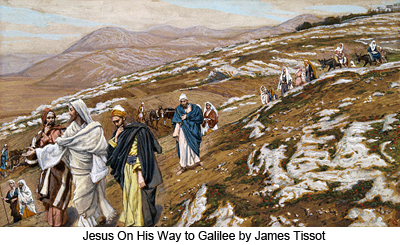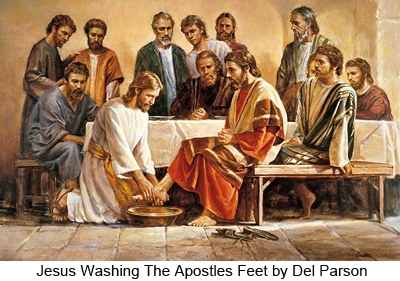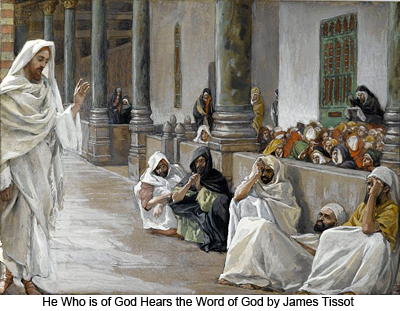 To "follow Jesus" means to personally share his religious faith and to enter into the spirit of the Master's life of unselfish service for man. One of the most important things in human living is to find out what Jesus believed, to discover his ideals, and to strive for the achievement of his exalted life purpose. Of all human knowledge, that which is of greatest value is to know the religious life of Jesus and how he lived it. ~ The Urantia Book, 196:1.3
To "follow Jesus" means to personally share his religious faith and to enter into the spirit of the Master's life of unselfish service for man. One of the most important things in human living is to find out what Jesus believed, to discover his ideals, and to strive for the achievement of his exalted life purpose. Of all human knowledge, that which is of greatest value is to know the religious life of Jesus and how he lived it. ~ The Urantia Book, 196:1.3
"As Jesus Passed By"
Jesus spread good cheer everywhere he went. He was full of grace and truth. His associates never ceased to wonder at the gracious words that proceeded out of his mouth. You can cultivate gracefulness, but graciousness is the aroma of friendliness which emanates from a love-saturated soul.
Goodness always compels respect, but when it is devoid of grace, it often repels affection. Goodness is universally attractive only when it is gracious. Goodness is effective only when it is attractive.
Jesus really understood men; therefore could he manifest genuine sympathy and show sincere compassion. But he seldom indulged in pity. While his compassion was boundless, his sympathy was practical, personal, and constructive. Never did his familiarity with suffering breed indifference, and he was able to minister to distressed souls without increasing their self-pity.
Jesus could help men so much because he loved them so sincerely. He truly loved each man, each woman, and each child. He could be such a true friend because of his remarkable insight—he knew so fully what was in the heart and in the mind of man. He was an interested and keen observer. He was an expert in the comprehension of human need, clever in detecting human longings.
Jesus was never in a hurry. He had time to comfort his fellow men "as he passed by." And he always made his friends feel at ease. He was a charming listener. He never engaged in the meddlesome probing of the souls of his associates. As he comforted hungry minds and ministered to thirsty souls, the recipients of his mercy did not so much feel that they were confessing to him as that they were conferring with him. They had unbounded confidence in him because they saw he had so much faith in them.
He never seemed to be curious about people, and he never manifested a desire to direct, manage, or follow them up. He inspired profound self- confidence and robust courage in all who enjoyed his association. When he smiled on a man, that mortal experienced increased capacity for solving his manifold problems.
Jesus loved men so much and so wisely that he never hesitated to be severe with them when the occasion demanded such discipline. He frequently set out to help a person by asking for help. In this way he elicited interest, appealed to the better things in human nature.
The Master could discern saving faith in the gross superstition of the woman who sought healing by touching the hem of his garment. He was always ready and willing to stop a sermon or detain a multitude while he ministered to the needs of a single person, even to a little child. Great things happened not only because people had faith in Jesus, but also because Jesus had so much faith in them.
Most of the really important things which Jesus said or did seemed to happen casually, "as he passed by." There was so little of the professional, the well-planned, or the premeditated in the Master's earthly ministry. He dispensed health and scattered happiness naturally and gracefully as he journeyed through life. It was literally true, "He went about doing good."
And it behooves the Master's followers in all ages to learn to minister as "they pass by"—to do unselfish good as they go about their daily duties. ~ The Urantia Book, 171:7.0
Other Passages About Jesus' Character
Could you have had but one look at him, you would have known that Jesus was a real man of great experience in the things of this world. The teachings of Jesus in this respect have been grossly perverted and much misrepresented all down through the centuries of the Christian era; you have also held perverted ideas about the Master's meekness and humility. What he aimed at in his life appears to have been a superb self-respect. He only advised man to humble himself that he might become truly exalted; what he really aimed at was true humility toward God. He placed great value upon sincerity—a pure heart. Fidelity was a cardinal virtue in his estimate of character, while courage was the very heart of his teachings. "Fear not" was his watchword, and patient endurance his ideal of strength of character. The teachings of Jesus constitute a religion of valor, courage, and heroism. And this is just why he chose as his personal representatives twelve commonplace men, the majority of whom were rugged, virile, and manly fishermen.
Jesus had little to say about the social vices of his day; seldom did he make reference to moral delinquency. He was a positive teacher of true virtue. He studiously avoided the negative method of imparting instruction; he refused to advertise evil. He was not even a moral reformer. He well knew, and so taught his apostles, that the sensual urges of mankind are not suppressed by either religious rebuke or legal prohibitions. His few denunciations were largely directed against pride, cruelty, oppression, and hypocrisy. ~ The Urantia Book, 140:8.20
 How People Saw Him
How People Saw Him
The most astonishing and the most revolutionary feature of Michael's mission on earth was his attitude toward women. In a day and generation when a man was not supposed to salute even his own wife in a public place, Jesus dared to take women along as teachers of the gospel in connection with his third tour of Galilee. And he had the consummate courage to do this in the face of the rabbinic teaching which declared that it was "better that the words of the law should be burned than delivered to women."
In one generation Jesus lifted women out of the disrespectful oblivion and the slavish drudgery of the ages. And it is the one shameful thing about the religion that presumed to take Jesus' name that it lacked the moral courage to follow this noble example in its subsequent attitude toward women.
As Jesus mingled with the people, they found him entirely free from the superstitions of that day. He was free from religious prejudices; he was never intolerant. He had nothing in his heart resembling social antagonism. While he complied with the good in the religion of his fathers, he did not hesitate to disregard man-made traditions of superstition and bondage. He dared to teach that catastrophes of nature, accidents of time, and other calamitous happenings are not visitations of divine judgments or mysterious dispensations of Providence. He denounced slavish devotion to meaningless ceremonials and exposed the fallacy of materialistic worship. He boldly proclaimed man's spiritual freedom and dared to teach that mortals of the flesh are indeed and in truth sons of the living God.
Jesus transcended all the teachings of his forebears when he boldly substituted clean hearts for clean hands as the mark of true religion. He put reality in the place of tradition and swept aside all pretensions of vanity and hypocrisy. And yet this fearless man of God did not give vent to destructive criticism or manifest an utter disregard of the religious, social, economic, and political usages of his day. He was not a militant revolutionist; he was a progressive evolutionist. He engaged in the destruction of that which was only when he simultaneously offered his fellows the superior thing which ought to be.
Jesus received the obedience of his followers without exacting it. Only three men who received his personal call refused to accept the invitation to discipleship. He exercised a peculiar drawing power over men, but he was not dictatorial. He commanded confidence, and no man ever resented his giving a command. He assumed absolute authority over his disciples, but no one ever objected. He permitted his followers to call him Master.
The Master was admired by all who met him except by those who entertained deep-seated religious prejudices or those who thought they discerned political dangers in his teachings. Men were astonished at the originality and authoritativeness of his teaching. They marveled at his patience in dealing with backward and troublesome inquirers. He inspired hope and confidence in the hearts of all who came under his ministry. Only those who had not met him feared him, and he was hated only by those who regarded him as the champion of that truth which was destined to overthrow the evil and error which they had determined to hold in their hearts at all cost.
On both friends and foes he exercised a strong and peculiarly fascinating influence. Multitudes would follow him for weeks, just to hear his gracious words and behold his simple life. Devoted men and women loved Jesus with a well-nigh superhuman affection. And the better they knew him the more they loved him. And all this is still true; even today and in all future ages, the more man comes to know this God-man, the more he will love and follow after him. ~ The Urantia Book, 149:2.8
He is our understanding brother, sympathetic friend, experienced sovereign, and merciful father. ~ The Urantia Book, 127:6.13
Jesus At Twenty-One
It is forever and gloriously true: "We have a high ruler who can be touched with the feeling of our infirmities. We have a Sovereign who was in all points tested and tempted like as we are, yet without sin." And since he himself has suffered, being tested and tried, he is abundantly able to understand and minister to those who are confused and distressed.
The Nazareth carpenter now fully understood the work before him, but he chose to live his human life in the channel of its natural flowing. And in some of these matters he is indeed an example to his mortal creatures, even as it is recorded: "Let this mind be in you which was also in Christ Jesus, who, being of the nature of God, thought it not strange to be equal with God. But he made himself to be of little import and, taking upon himself the form of a creature, was born in the likeness of mankind. And being thus fashioned as a man, he humbled himself and became obedient to death, even the death of the cross."
He lived his mortal life just as all others of the human family may live theirs, "who in the days of the flesh so frequently offered up prayers and supplications, even with strong feelings and tears, to him who is able to save from all evil, and his prayers were effective because he believed." Wherefore it behooved him in every respect to be made like his brethren that he might become a merciful and understanding sovereign ruler over them. ~ The Urantia Book, 128:1.4
It was not so much what Jesus taught about the balanced character that impressed his associates as the fact that his own life was such an eloquent exemplification of his teaching. He lived in the midst of stress and storm, but he never wavered. His enemies continually laid snares for him, but they never entrapped him. The wise and learned endeavored to trip him, but he did not stumble. They sought to embroil him in debate, but his answers were always enlightening, dignified, and final. When he was interrupted in his discourses with multitudinous questions, his answers were always significant and conclusive. Never did he resort to ignoble tactics in meeting the continuous pressure of his enemies, who did not hesitate to employ every sort of false, unfair, and unrighteous mode of attack upon him. ~ The Urantia Book, 149:4.5
 A Midwayer's Observations
A Midwayer's Observations
The Master displayed great wisdom and manifested perfect fairness in all of his dealings with his apostles and with all of his disciples. Jesus was truly a master of men; he exercised great influence over his fellow men because of the combined charm and force of his personality. There was a subtle commanding influence in his rugged, nomadic, and homeless life. There was intellectual attractiveness and spiritual drawing power in his authoritative manner of teaching, in his lucid logic, his strength of reasoning, his sagacious insight, his alertness of mind, his matchless poise, and his sublime tolerance. He was simple, manly, honest, and fearless. With all of this physical and intellectual influence manifest in the Master's presence, there were also all those spiritual charms of being which have become associated with his personality— patience, tenderness, meekness, gentleness, and humility.
Jesus of Nazareth was indeed a strong and forceful personality; he was an intellectual power and a spiritual stronghold. His personality not only appealed to the spiritually minded women among his followers, but also to the educated and intellectual Nicodemus and to the hardy Roman soldier, the captain stationed on guard at the cross, who, when he had finished watching the Master die, said, "Truly, this was a Son of God." And red- blooded, rugged Galilean fishermen called him Master.
The pictures of Jesus have been most unfortunate. These paintings of the Christ have exerted a deleterious influence on youth; the temple merchants would hardly have fled before Jesus if he had been such a man as your artists usually have depicted. His was a dignified manhood; he was good, but natural. Jesus did not pose as a mild, sweet, gentle, and kindly mystic. His teaching was thrillingly dynamic. He not only meant well, but he went about actually doing good.
The Master never said, Come to me all you who are indolent and all who are dreamers." But he did many times say, "Come to me all you who labor, and I will give you rest—spiritual strength." The Master's yoke is, indeed, easy, but even so, he never imposes it; every individual must take this yoke of his own free will.
Jesus portrayed conquest by sacrifice, the sacrifice of pride and selfishness. By showing mercy, he meant to portray spiritual deliverance from all grudges, grievances, anger, and the lust for selfish power and revenge. And when he said, "Resist not evil," he later explained that he did not mean to condone sin or to counsel fraternity with iniquity. He intended the more to teach forgiveness, to "resist not evil treatment of one's personality, evil injury to one's feelings of personal dignity." ~ The Urantia Book, 141:3.4
What the Apostles Noticed and Admired About Jesus' Character
The apostles were beginning to recognize the unaffected friendliness of Jesus. Though the Master was easy of approach, he always lived independent of, and above, all human beings. Not for one moment was he ever dominated by any purely mortal influence or subject to frail human judgment. He paid no attention to public opinion, and he was uninfluenced by praise. He seldom paused to correct misunderstandings or to resent misrepresentation. He never asked any man for advice; he never made requests for prayers
James was astonished at how Jesus seemed to see the end from the beginning. The Master rarely appeared to be surprised. He was never excited, vexed, or disconcerted. He never apologized to any man. He was at times saddened, but never discouraged.
More clearly John recognized that, notwithstanding all of his divine endowments, after all, he was human. Jesus lived as a man among men and understood, loved, and knew how to manage men. In his personal life he was so human, and yet so faultless. And he was always unselfish. ~ The Urantia Book, 141:7.12
Andrew admired Jesus because of his consistent sincerity, his unaffected dignity. When men once knew Jesus, they were possessed with the urge to share him with their friends; they really wanted all the world to know him. ~ The Urantia Book, 139:1.11
The one trait which Peter most admired in Jesus was his supernal tenderness. Peter never grew weary of contemplating Jesus' forbearance. He never forgot the lesson about forgiving the wrongdoer, not only seven times but seventy times and seven. He thought much about these impressions of the Master's forgiving character during those dark and dismal days immediately following his thoughtless and unintended denial of Jesus in the high priest's courtyard. ~ The Urantia Book, 139:2.5
That characteristic of Jesus which James most admired was the Master's sympathetic affection. Jesus' understanding interest in the small and the great, the rich and the poor, made a great appeal to him. ~ The Urantia Book, 139:3.6
Those characteristics of Jesus which John most appreciated were the Master's love and unselfishness; these traits made such an impression on him that his whole subsequent life became dominated by the sentiment of love and brotherly devotion. He talked about love and wrote about love. This "son of thunder" became the "apostle of love"; and at Ephesus, when the aged bishop was no longer able to stand in the pulpit and preach but had to be carried to church in a chair, and when at the close of the service he was asked to say a few words to the believers, for years his only utterance was, "My little children, love one another." ~ The Urantia Book, 139:4.6
The one quality about Jesus which Philip so continuously admired was the Master's unfailing generosity. Never could Philip find anything in Jesus which was small, niggardly, or stingy, and he worshiped this ever-present and unfailing liberality. ~ The Urantia Book, 139:5.6
Nathaniel most revered Jesus for his tolerance. He never grew weary of contemplating the broadmindedness and generous sympathy of the Son of Man. ~ The Urantia Book, 139:6.8
It was the Master's forgiving disposition which Matthew most appreciated. He would never cease to recount that faith only was necessary in the business of finding God. He always liked to speak of the kingdom as "this business of finding God." ~ The Urantia Book, 139:7.4
Increasingly [the apostle]Thomas admired and honored one who was so lovingly merciful yet so inflexibly just and fair; so firm but never obstinate; so calm but never indifferent; so helpful and so sympathetic but never meddlesome or dictatorial; so strong but at the same time so gentle; so positive but never rough or rude; so tender but never vacillating; so pure and innocent but at the same time so virile, aggressive, and forceful; so truly courageous but never rash or foolhardy; such a lover of nature but so free from all tendency to revere nature; so humorous and so playful, but so free from levity and frivolity. It was this matchless symmetry of personality that so charmed Thomas. He probably enjoyed the highest intellectual understanding and personality appreciation of Jesus of any of the twelve. ~ The Urantia Book, 139:8.7
James Alpheus especially loved Jesus because of the Master's simplicity.
Judas Alpheus was drawn toward Jesus because of the Master's unostentatious humility. Such humility linked with such personal dignity made a great appeal to Judas. The fact that Jesus would always enjoin silence regarding his unusual acts made a great impression on this simple child of nature. ~ The Urantia Book, 139:9.6
The one thing about Jesus which Simon so much admired was the Master's calmness, his assurance, poise, and inexplicable composure. ~ The Urantia Book, 139:11.5
There was no special trait about Jesus which Judas [Iscariot] admired above the generally attractive and exquisitely charming personality of the Master. Judas was never able to rise above his Judean prejudices against his Galilean associates; he would even criticize in his mind many things about Jesus. ~ The Urantia Book, 139:12.4
The Acme of Religious Living
Although the average mortal of Urantia cannot hope to attain the high perfection of character which Jesus of Nazareth acquired while sojourning in the flesh, it is altogether possible for every mortal believer to develop a strong and unified personality along the perfected lines of the Jesus personality. The unique feature of the Master's personality was not so much its perfection as its symmetry, its exquisite and balanced unification. The most effective presentation of Jesus consists in following the example of the one who said, as he gestured toward the Master standing before his accusers, "Behold the man!"
 The unfailing kindness of Jesus touched the hearts of men, but his stalwart strength of character amazed his followers. He was truly sincere; there was nothing of the hypocrite in him. He was free from affectation; he was always so refreshingly genuine. He never stooped to pretense, and he never resorted to shamming. He lived the truth, even as he taught it. He was the truth. He was constrained to proclaim saving truth to his generation, even though such sincerity sometimes caused pain. He was unquestioningly loyal to all truth.
The unfailing kindness of Jesus touched the hearts of men, but his stalwart strength of character amazed his followers. He was truly sincere; there was nothing of the hypocrite in him. He was free from affectation; he was always so refreshingly genuine. He never stooped to pretense, and he never resorted to shamming. He lived the truth, even as he taught it. He was the truth. He was constrained to proclaim saving truth to his generation, even though such sincerity sometimes caused pain. He was unquestioningly loyal to all truth.
But the Master was so reasonable, so approachable. He was so practical in all his ministry, while all his plans were characterized by such sanctified common sense. He was so free from all freakish, erratic, and eccentric tendencies. He was never capricious, whimsical, or hysterical. In all his teaching and in everything he did there was always an exquisite discrimination associated with an extraordinary sense of propriety.
The Son of Man was always a well-poised personality. Even his enemies maintained a wholesome respect for him; they even feared his presence. Jesus was unafraid. He was surcharged with divine enthusiasm, but he never became fanatical. He was emotionally active but never flighty. He was imaginative but always practical. He frankly faced the realities of life, but he was never dull or prosaic. He was courageous but never reckless; prudent but never cowardly. He was sympathetic but not sentimental; unique but not eccentric. He was pious but not sanctimonious. And he was so well-poised because he was so perfectly unified.
Jesus' originality was unstifled. He was not bound by tradition or handicapped by enslavement to narrow conventionality. He spoke with undoubted confidence and taught with absolute authority. But his superb originality did not cause him to overlook the gems of truth in the teachings of his predecessors and contemporaries. And the most original of his teachings was the emphasis of love and mercy in the place of fear and sacrifice.
Jesus was very broad in his outlook. He exhorted his followers to preach the gospel to all peoples. He was free from all narrow-mindedness. His sympathetic heart embraced all mankind, even a universe. Always his invitation was, "Whosoever will, let him come."
Of Jesus it was truly said, "He trusted God." As a man among men he most sublimely trusted the Father in heaven. He trusted his Father as a little child trusts his earthly parent. His faith was perfect but never presumptuous. No matter how cruel nature might appear to be or how indifferent to man's welfare on earth, Jesus never faltered in his faith. He was immune to disappointment and impervious to persecution. He was untouched by apparent failure.
He loved men as brothers, at the same time recognizing how they differed in innate endowments and acquired qualities. "He went about doing good."
Jesus was an unusually cheerful person, but he was not a blind and unreasoning optimist. His constant word of exhortation was, "Be of good cheer." He could maintain this confident attitude because of his unswerving trust in God and his unshakable confidence in man. He was always touchingly considerate of all men because he loved them and believed in them. Still he was always true to his convictions and magnificently firm in his devotion to the doing of his Father's will.
The Master was always generous. He never grew weary of saying, "It is more blessed to give than to receive." Said he, "Freely you have received, freely give." And yet, with all of his unbounded generosity, he was never wasteful or extravagant. He taught that you must believe to receive salvation. "For every one who seeks shall receive."
He was candid, but always kind. Said he, "If it were not so, I would have told you." He was frank, but always friendly. He was outspoken in his love for the sinner and in his hatred for sin. But throughout all this amazing frankness he was unerringly fair.
Jesus was consistently cheerful, notwithstanding he sometimes drank deeply of the cup of human sorrow. He fearlessly faced the realities of existence, yet was he filled with enthusiasm for the gospel of the kingdom. But he controlled his enthusiasm; it never controlled him. He was unreservedly dedicated to "the Father's business." This divine enthusiasm led his unspiritual brethren to think he was beside himself, but the onlooking universe appraised him as the model of sanity and the pattern of supreme mortal devotion to the high standards of spiritual living. And his controlled enthusiasm was contagious; his associates were constrained to share his divine optimism.
This man of Galilee was not a man of sorrows; he was a soul of gladness. Always was he saying, "Rejoice and be exceedingly glad." But when duty required, he was willing to walk courageously through the "valley of the shadow of death." He was gladsome but at the same time humble.
His courage was equaled only by his patience. When pressed to act prematurely, he would only reply, "My hour has not yet come." He was never in a hurry; his composure was sublime. But he was often indignant at evil, intolerant of sin. He was often mightily moved to resist that which was inimical to the welfare of his children on earth. But his indignation against sin never led to anger at the sinner.
 His courage was magnificent, but he was never foolhardy. His watchword was, "Fear not." His bravery was lofty and his courage often heroic. But his courage was linked with discretion and controlled by reason. It was courage born of faith, not the recklessness of blind presumption. He was truly brave but never audacious.
His courage was magnificent, but he was never foolhardy. His watchword was, "Fear not." His bravery was lofty and his courage often heroic. But his courage was linked with discretion and controlled by reason. It was courage born of faith, not the recklessness of blind presumption. He was truly brave but never audacious.
The Master was a pattern of reverence. The prayer of even his youth began, "Our Father who is in heaven, hallowed be your name." He was even respectful of the faulty worship of his fellows. But this did not deter him from making attacks on religious traditions or assaulting errors of human belief. He was reverential of true holiness, and yet he could justly appeal to his fellows, saying, "Who among you convicts me of sin?"
Jesus was great because he was good, and yet he fraternized with the little children. He was gentle and unassuming in his personal life, and yet he was the perfected man of a universe. His associates called him Master unbidden.
Jesus was the perfectly unified human personality. And today, as in Galilee, he continues to unify mortal experience and to co- ordinate human endeavors. He unifies life, ennobles character, and simplifies experience. He enters the human mind to elevate, transform, and transfigure it. It is literally true: "If any man has Christ Jesus within him, he is a new creature; old things are passing away; behold, all things are becoming new." ~ The Urantia Book, 100:7.0


